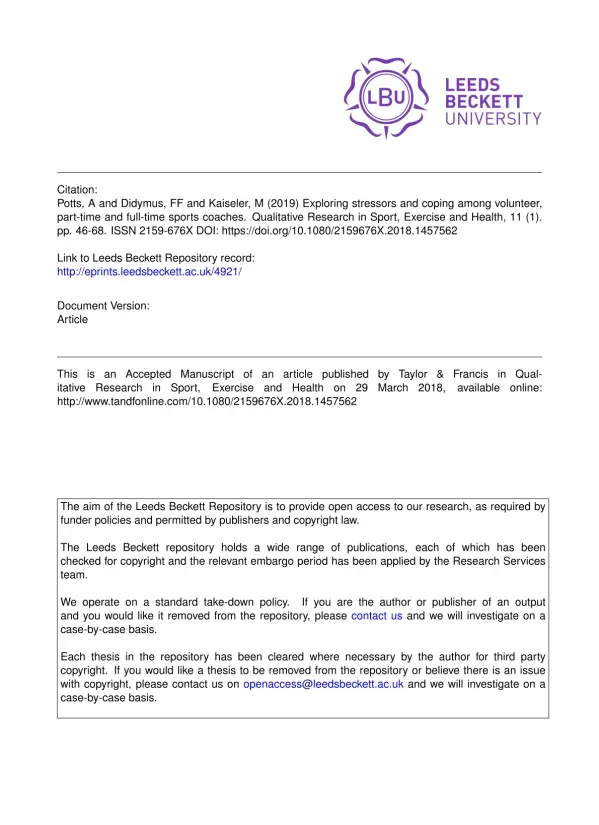
Exploring Stressors and Coping Strategies Among Sports Coaches
Document information
| Author | Alexandra J. Potts |
| School | Leeds Beckett University |
| Year of publication | 2018 |
| Place | United Kingdom |
| Document type | article |
| Language | English |
| Number of pages | 50 |
| Format | |
| Size | 339.88 KB |
- coaching
- occupational stress
- coping strategies
Summary
I. Introduction to Stressors in Coaching
The coaching profession encompasses a wide range of roles, including part-time and full-time positions. Stressors faced by coaches can be categorized into three main themes: coach-related, athlete-related, and organizational. The literature has primarily focused on full-time, paid male coaches, neglecting the experiences of part-time and voluntary coaches. This oversight is significant, as part-time and voluntary coaches constitute a substantial portion of the coaching workforce, making up 97% in the UK. The lack of representation in research leads to a biased understanding of the coaching landscape. As noted, 'an explicit focus on men and women coaches who are working at all levels of the labour force is required.' This highlights the need for a more inclusive approach to understanding the stressors that affect coaches across different employment bases.
1.1 The Role of Coaches
Coaches play a critical role in the development and retention of sport participants. They are essential in addressing global issues such as physical inactivity. The demands placed on coaches are complex, requiring them to integrate professional, interpersonal, and intrapersonal knowledge. As stated, 'psychological stress can negatively affect a coach’s performance by impeding their focus and decision-making abilities.' This underscores the importance of understanding the stressors that coaches face, as they directly impact their effectiveness and the well-being of the athletes they mentor.
II. Coping Strategies Employed by Coaches
Coping strategies are vital for managing the stressors encountered in coaching. The study identified seven themes of coping strategies: problem-solving, information seeking, escape, negotiation, self-reliance, dyadic coping, and support seeking. These strategies reflect the dynamic interplay between stressors and the coping mechanisms employed by coaches. For instance, problem-solving involves actively addressing the challenges faced, while support seeking emphasizes the importance of social networks in alleviating stress. The findings suggest that effective coping strategies can mitigate the negative impacts of stressors and enhance overall performance. As highlighted, 'we propose several impactful recommendations for researchers and practitioners,' indicating the practical applications of these findings in coach education and training.
2.1 Importance of Support Networks
Support networks play a crucial role in the coping process. Coaches who engage in dyadic coping often find that sharing experiences with peers can lead to better stress management. The study emphasizes that 'researchers continue to generate rich understanding of stressors and coping among coaches.' This ongoing exploration is essential for developing effective stress management interventions tailored to the unique challenges faced by coaches in various contexts.
III. Implications for Coaching Practice
The insights gained from this study have significant implications for coaching practice. Understanding the stressors and coping strategies of coaches can inform the development of targeted interventions aimed at enhancing coach well-being and performance. National governing bodies are encouraged to work with practitioners to incorporate stress management training into coach education programs. This proactive approach can lead to improved performance under pressure and better retention of coaches in the profession. As stated, 'we encourage national governing bodies to work with practitioners to incorporate specific foci on stress and stress management during coach education programmes.' Such initiatives can foster a healthier coaching environment and ultimately benefit athletes.
3.1 Future Research Directions
Future research should continue to explore the diverse experiences of coaches across different employment bases. This includes examining the unique challenges faced by female coaches and those in part-time or voluntary roles. By broadening the scope of research, a more comprehensive understanding of the coaching landscape can be achieved. The study's findings serve as a foundation for further investigation into the stressors and coping strategies that shape the coaching experience, ultimately contributing to the development of effective support systems.
Document reference
- Exploring Stressors and Coping Among Volunteer, Part-Time, and Full-Time Sports Coaches (Alexandra J. Potts, Faye F. Didymus, Mariana Kaiseler)
- Psychological Stress in Sport (Frey)
- Psychological Stress and Coaches' Performance (Levy et al.)
- The Impact of Psychological Stress on Elite Coaches (Fletcher and Scott)
- Transactional Stress Theory (Lazarus and Folkman)
